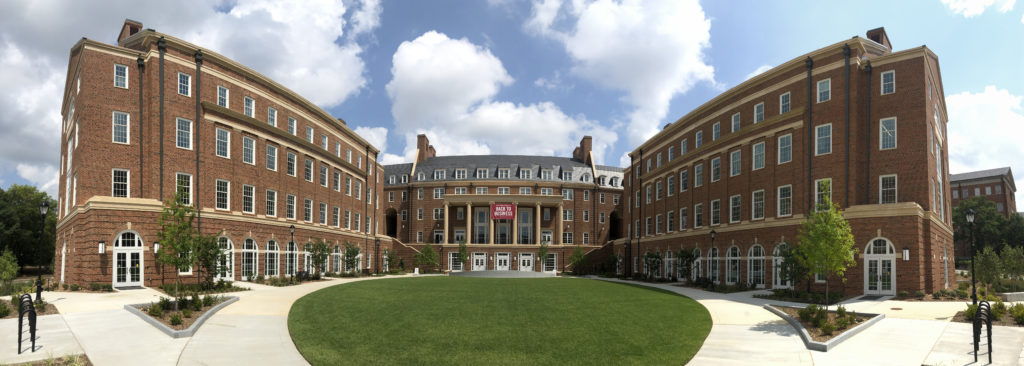
The COVID-19 economic recession is very likely over in Georgia, but the state still faces a hard slog to reach a full recovery, according to a new forecast from the University of Georgia Terry College of Business.
The state is on track to recover more quickly in the coming year than the U.S. economy, with a 4% growth rate compared to the nationwide projection of 3.5% growth in gross domestic product, said Dean Benjamin C. Ayers at UGA’s 38th annual Georgia Economic Outlook.
“Our economic forecast for Georgia calls for the economic recovery to continue with the main drivers being consumer spending, the booming housing market and Federal Reserve policies,” Ayers said. “Full recovery of the economy will arrive sooner in Georgia than in the United States. In Georgia, there’s relatively less economic debris to clean up.”
UGA livestreamed its forecast for the first time. It is based on the Georgia Economic Outlook report, produced by the Selig Center for Economic Growth. The complete forecast is available at https://www.terry.uga.edu/about/selig/publications.php.
Georgia is estimated to see its economy contract by 3.7% by the end of 2020, once the dust from the spring’s partial shutdown is swept away. Next year’s projected growth rate of 4% means the state is on track to recoup 2020’s losses by the end of the year. Still, growth in employment levels and personal income will lag GDP growth.
Georgia’s unemployment rate will drop from 6% to 5.1% in 2021. It was 3.4% in 2019. Personal income is forecast to grow by only 0.2% as the boost from federal stimulus payments winds down. Nationally, the unemployment rate will drop from 8.6% to 8% next year, and personal income will shrink 1.1%.
The Selig Center’s baseline forecast assumes that an effective COVID-19 vaccine will be widely available by midyear. That will push the peak of the economic recovery into the third and fourth quarters.
Despite many promising indicators, Georgia and the United States still face considerable headwinds, including public anxiety over the coronavirus, depressed demand for many services – like restaurant dining and movie theaters – and slow wage growth.
“We are in the second phase of the recovery currently, which is an extended period of choppy economic growth that will linger until an effective vaccine is widely available,” Ayers said. “It’s going to be a slog to get back to a period of steady, above-average economic growth.”
The risk of the economy entering into a second recession is about 40%, and it’s not just a matter of whether the COVID-19 epidemic becomes worse. An escalation of the unresolved trade disputes with China or a collapse of the corporate credit markets could also derail the recovery.
Piecemeal job recovery
The COVID-19 recession only lasted three months, but the plunge was massive. It dropped the state’s employment rate by 11 percent in about a month. That was larger than the drop seen during the Great Recession and much more sudden. While employment has recovered substantially from its low point and will continue to grow during 2021, many industries will not fully recover for several years.
Jobs in entertainment and hospitality may see some of the fastest recoveries, but those will be measured from a near all-time low. It may take many years for the state to recoup the jobs lost in these sectors, according to the Selig Center.
Logistics, distribution, business services, financial technology, education and health services will be the sectors to return to full employment most quickly.
Needing more room, housing booms
The housing market and home construction experienced a V-shaped recovery during 2020 and is poised to drive a large part of Georgia’s growth in 2021.
Increased homebuilding not only stimulates construction and real estate commissions, but also consumer goods sales, logistics and transportation, and producers of building materials, floor coverings and lumber – all prevalent in Georgia.
Record low mortgage rates and a generational shift will spur the building boom. Millennials who delayed homeownership after the Great Recession are buying homes in larger numbers, while elderly homeowners are opting to stay in place.
The experience of telecommuting and living in a bubble for nearly a year has also increased homeowners’ desire for larger, nicer homes.
To meet that demand, the number of single-family homes built in 2021 will rise by 19% in Georgia. Multi-unit residential construction will increase by 6%.
“These are impressive gains for an economy that is struggling to recover,” Ayers said.
Georgia will also see a marked increase in consumer spending. Leveraging savings laid aside and rising home values, consumers will increase spending on durable goods to furnish their homes. Commercial construction will not see this boom. The market is still absorbing the ample supply of retail and business space currently available.
Recruiting new industry
Another factor buoying Georgia’s growth prospects in 2021 is the culmination of many major economic development projects. Four new Fortune 1000 companies moved their headquarters to Georgia in 2020. State economic developers were successful in recruiting other businesses to migrate to the state as well, despite the pandemic.
“Nine of the 10 largest projects announced in the first three quarters of 2020 were announced after the COVID-19 shutdown began,” Ayers said. “This success reflects many factors that make Georgia a great state in which to do business.”
"smooth" - Google News
December 03, 2020 at 11:58PM
https://ift.tt/3ojXvbl
Choppy rebound from pandemic recession to smooth out - University of Georgia
"smooth" - Google News
https://ift.tt/30JhCVH
Shoes Man Tutorial
Pos News Update
Meme Update
Korean Entertainment News
Japan News Update
Bagikan Berita Ini














0 Response to "Choppy rebound from pandemic recession to smooth out - University of Georgia"
Post a Comment